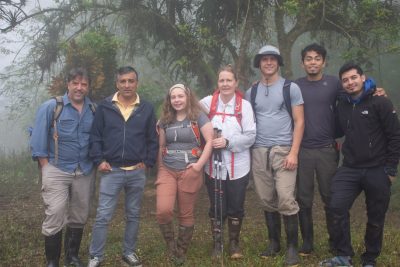
John L. Clark, PhD, officially joined the Selby Gardens staff this January. The field botanist with expertise in gesneriads has been contributing significantly to science at Selby Gardens for more than two decades.
Since 2009, Clark has been affiliated with Selby Gardens as a research associate, collaborating with our staff scientists, adding to our collections, and helping to expand our publication base. He actually made his first donation of a specimen back in the mid-1990s. Now a full-time member of the Botany team, Clark concentrates his work on the family Gesneriaceae, flowering plants distributed throughout the world’s tropical forests. About a third of gesneriads are epiphytic, and thus a major focus of Selby Gardens’ research mission. In fact, the Gardens’ original seal, created by cofounder Dr. Carlyle Luer, includes illustrations of a bromeliad, an orchid, and a gesneriad.
Gesneriads are commonly grown horticulturally (think African violets, gloxinia, lipstick plants), and they are important scientifically as a model for understanding broad-scale patterns in the evolution, pollination, and diversification of plants. That’s where Clark comes in. An evolutionary biologist as well as a botanist, he is interested in systematics and biodiversity. He studies the evolution of plants, focusing on their identification, classification, and taxonomy.

John L. Clark, left, with colleagues in an Ecuadorean cloud forest.
Clark publishes his research and collects wild specimens prolifically, trekking to the Caribbean, the Andes, and elsewhere for field research. The body of photography and additional plant specimens he brings with him to Selby Gardens is varied and exceptional. “Once we tally it up, I’m pretty sure that John will have made one of the most significant donations of specimens to our collection in the history of the institution,” says Vice President for Botany Bruce Holst.
Clark remains a research associate with the Royal Botanic Garden Edinburgh and the Smithsonian National Museum of Natural History. His previous appointments include curator of The University of Alabama’s herbarium and professor in the Department of Biological Sciences. Most recently, Clark served as the Aldo Leopold Distinguished Teaching Chair at the Lawrenceville School in New Jersey. Leopold was one of the foremost American wildlife conservationists of the 20th century and a 1905 graduate of the Lawrenceville School, and Clark has centered his own career on teaching and promoting a passion for biodiversity. His ability to connect with and inspire future scientists surely will boost Selby Gardens’ environmental education efforts too, both on our campuses and beyond.
